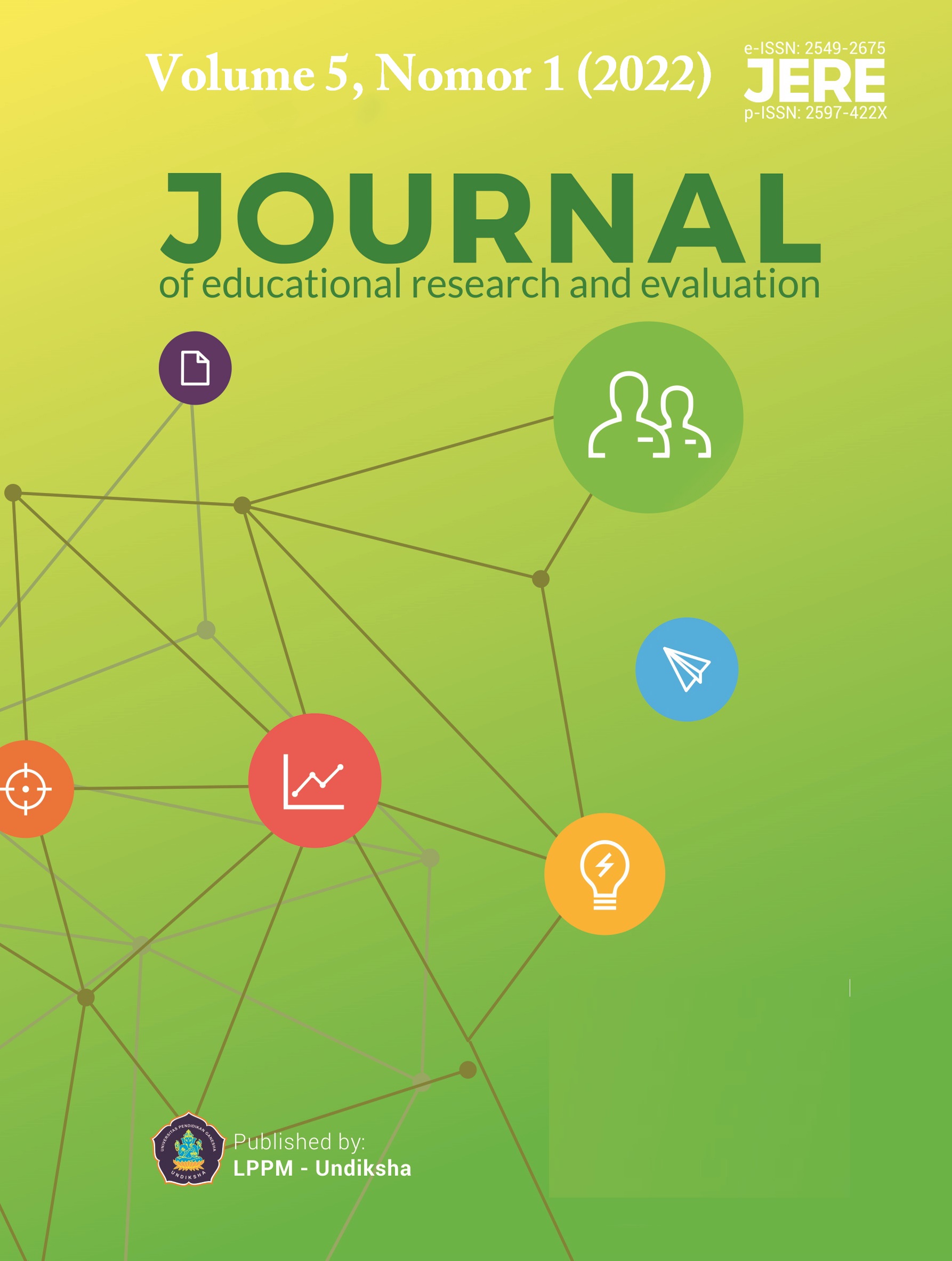Implementation of Think Pair Share (TPS) Cooperative Learning Model to Improve Mathematical Connection Ability
DOI:
https://doi.org/10.23887/jere.v5i1.24930Keywords:
Mathematical connection, Think-Pair-Share (TPS), Cooperative Learning, DerivativeAbstract
This article aims to describe the application of Think Pair Share (TPS) cooperative learning models to improve students 'mathematical connection abilities on derivative material. The mathematical connection indicators in this study are (1) the ability of mathematical connections between mathematical topics, (2) the ability of mathematical connections with other subjects, (3) the ability of mathematical connections with problems in daily life. This research is a class action research (CAR) conducted in class XI-G4 SMA Negeri 5 Malang in two cycles. The first cycle was carried out in five meetings, four meetings for the implementation of learning and one meeting for the final test of the first cycle. Whereas in the second cycle held in five meetings, namely four meetings for the implementation of learning and one meeting for the final test of the second cycle. The results of the research showed that an increase in students' mathematical connections from cycle I to cycle II was indicated by an increase in the grade average and the percentage of completeness in class learning. The classical average in cycle I was 82.79 and increased by 8.56 to 91.35 in cycle II, and the percentage of completeness in cycle I was 70.59% from 34 students and increased by 11.76% to 82.35% of 34 students in the second cycle.
References
Afifah, R. N. (2017). Kemampuan Koneksi Matematis Pada Bangun Ruang Sisi Lengkung. (hal. 619-624). Yogyakarta: Universitas Negeri Yogyakarta.
Afthina, H., Mardiyana, & Pramudya, I. (2017). Think Pair Share Using Realistic Mathematics Education Approach in Geometry Learning. International Conference on Mathematics and Science Education (ICMScE), 1.
Armawan, I. M., & Sugita, G. (2014). Penerapan Model Pembelajaran Kooperatif Tipe Think Pair Share (TPS) untuk Meingkatkan Hasil Belajar Siswa pada Materi Pemfaktoran Bentuk Kuadrat di Kelas VIII SMPN 7 Palu. Jurnal Elektronik Pendidikan Matematika Tadulako, 2(2), 117-126.
Aziz, Z., & Hossain, A. 2010. A Comparison of Cooperative Learning and Conventional Teaching on Students’ Achievement in Secondary Mathematics. Procedia Social And Behavioral Sciences. 9. 53–62.
Gokkurt, B., Dundar, S., Soylu, Y., & Akgun, L. 2012. The Effects of Learning Together Technique Which is Based on Cooperative Learning on Students’ achievement in Mathematics Class. Procedia - Social And Behavioral Sciences 46 ( 2012 ) 3431 – 3434
Hossain, A., & Tarmizi, R. 2013. Effects of Cooperative Learning on Students’ Achievement and Attitudes in Secondary Mathematics. Procedia - Social And Behavioral Sciences. 93 (2013) 473 – 477.
Jumarniati, Kartika, D., Baharuddin, M. 2018. Penerapan Model Pembelajaran Kooperatif pada Mata Kuliah Program Linear melalui Lesson Study. Jurnal Matematika dan Pembelajaran Vol. 6, No 2.
Kamal, S. (2016). Implementasi Model Pembelajaran Think-Pair-Share (Tps) Untuk Meningkatkan Aktivitas Dan Hasil Belajar Siswa. Math Didactic: Jurnal Pendidikan Matematika, 2(1), 1–11.
Karnasih, I., & Sinaga, M. (2014). Enhancing Mathematical Problem Solving and Mathematical Connection Through the Use of Dynamic Software Autograph in Cooperative Learning Think-Pair-Share. SAINSAB Vol. 17, 51-71.
Kunandar. (2010). Langkah Mudah Penelitian Tindakan Kelas sebagai Pengembangan Profesi Guru (1 ed.). Jakarta: PT. Rajawali Pers.
Lavasani, M., & Khandan, F. 2011. The Effect of Cooperative Learning on Mathematics Anxiety and Help Seeking Behavior. Procedia Social And Behavioral Sciences 15 (2011) 271–276
Lee, C. (2006). Language for Learning Mathematics Assessment for Learning in Practice. New York: Open University Press.
NCTM. (2000). Principles and Standards for School Mathematics. Reston: The National Council of Teachers of Mathematics, Inc.
Patrianto, U., Sa'dijah, C., & Qohar, A. (2012). Penerapan Model Pembelajaran Kooperatif Tipe Think Pair Share untuk Memahamkan Materi Logaritma Kelas X SMKN 5 Malang. Jurnal Pendidikan Matematika, 1 (1).
Pawattana, A., Prasarnpanich, S., & Attanawong, R. 2014. Enhancing Primary School Students’ Social Skills Using Cooperative Learning in Mathematics. Procedia - Social And Behavioral Sciences 112 ( 2014 ) 656 – 661
Rifa'i, A., & Lestari, H. P. (2017). The Effect of Think Pair Share (TPS) using scientific approach on students' self-confidence and mathematical problem-solving. International Conference on Mathematics, Science, and Education 2017 (ICMSE2017), 1.
Sujana, A., & Maskhopipah. (2017). Penerapan Model Pembelajaran Kooperatif tipe Think Pair Share (TPS) untuk Meningkatkan Kemampuan Pemecahan Masalah Matematika Siswa. Pasundan Journal of Research in Mathematics Learning and Education, 2 (1), 43-52.
Surya, E., & Maisyarah, R. (2017). Kemampuan Koneksi Matematis (Connecting Mathematics Ability) Siswa dalam Menyelesaikan Masalah Matematika. Medan: State University of Medan.
Uno, H. B., Lamatenggo, N., & Koni, S. M. (2012). Menjadi Peneliti PTK yang Profesional (2 ed.). Jakarta: Bumi Aksara.
Walle, J. A. (2008). Matematika Sekolah Dasar dan Menengah (Terjemahan) Jilid 1. Jakarta: Penerbit Erlangga.
Downloads
Published
How to Cite
Issue
Section
License
Authors who publish with the Journal of Evaluation and Research in Education (JERE) agree to the following terms:
- Authors retain copyright and grant the journal the right of first publication with the work simultaneously licensed under a Creative Commons Attribution License (CC BY-SA 4.0) that allows others to share the work with an acknowledgment of the work's authorship and initial publication in this journal.
- Authors are able to enter into separate, additional contractual arrangements for the non-exclusive distribution of the journal's published version of the work (e.g., post it to an institutional repository or publish it in a book), with an acknowledgment of its initial publication in this journal.
- Authors are permitted and encouraged to post their work online (e.g., in institutional repositories or on their website) prior to and during the submission process, as it can lead to productive exchanges, as well as earlier and greater citation of published work. (See The Effect of Open Access)











